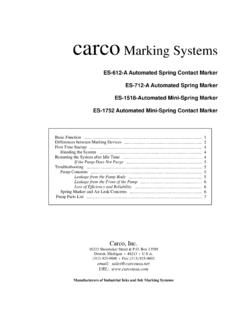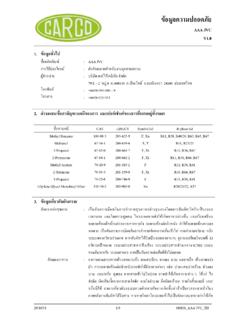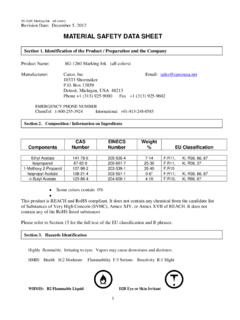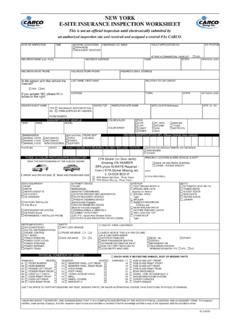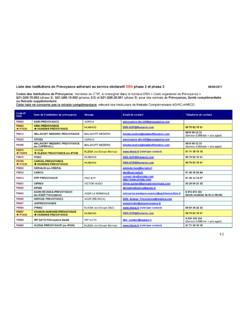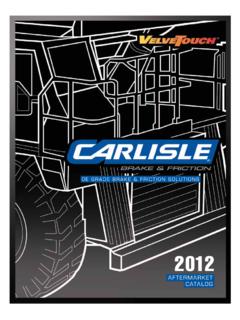Transcription of BEST PRACTICE STANDARDS - HIRE Network
1 NatioNal WorkrightsiNstituteBEST PRACTICE STAN DARDSTHE PROPER USE OF CRIMINAL RECORDS IN HIRINGCONTRIBUTORS SPONSORING ORGANIZATION STAFF:Roberta Meyers has served as Director of the Legal Action Center s National Network project since 2005. Prior to her appointment as director, she held policy and direct service positions at the Legal Action Center for nearly 15 years. She has worked with policy makers and advocates around the country to identify public policy priorities that directly affect employment opportunities for people with criminal records and helped develop appropriate strategies to strengthen existing legislation or create model policies in individual states. She has trained hundreds of workforce development and corrections staff on employment strategies that best serve job seekers with criminal histories. She has authored guidebooks and policy briefs on criminal record policies that impact employment and has been called to testify before Congress, federal administrative agencies, and state P.
2 McClain has served as Director of the Employment Discrimination Project for the Lawyers Committee for Civil Rights Under Law since 2010. In that position he leads the Committee s efforts to combat employment discrimination through litigation, public education and policy advocacy. For over 30 years prior to joining the Lawyers Committee, he practiced law in South Carolina in the areas of civil rights, employment and labor law, and complex federal litigation; in 1978 and again in 1998 he successfully argued cases in the Supreme Court. He was a member of the Advisory Board that established STANDARDS for certification of Employment and Labor Law specialists in the 1980s and was certified as a specialist in Employment and Labor Law in South Carolina for 20 Maltby is president of the National Workrights Institute. He has testified before Congress on the use of criminal records in employment and served on advisory taskforces to the United States Department of Justice and SEARCH (the association of state criminal record repositories).
3 Prior to founding NWI, Mr. Maltby was Director of Employment Rights for the ACLU. Working in the private sector for a number of years, he served as Executive Vice President/General Counsel of Drexelbrook Controls, Inc., where his responsibilities included Human FROM THE BACKGROUND SCREENING INDUSTRY:The consultants participation in the development of this document reflects only the professional views of the consultants and their companies, not the views or endorsement of any association of which they are members or officers. Attorney Lester S. Rosen is Founder and CEO of Employment Screening Resources (ESR) a nationwide background check company located in California. ESR is an accredited screening firm under the National Association of Professional Background Screeners (NAPBS ) accreditation program. He is the author of both The Safe Hiring Manual The Complete Guide to Employment Screening Background Checks for Employers, Recruiters, and Jobseekers (Facts on Demand Press, October 2012), a comprehensive book on employment screening, and The Safe Hiring Audit (2008).
4 Mr. Rosen was the chair of the steering committee that founded the NAPBS , a professional trade organization for the screening industry, and served as one of the first co-chairs in 2004. He is a frequent presenter nationwide on pre-employment screening and safe hiring issues. Frederick G. Giles is Senior Vice President of CARCO s Research Division. CARCO Group, Inc., is a nationwide background check company with offices located throughout the United States and is an accredited screening firm under the National Association of Professional Background Screeners (NAPBS ) accreditation program. Mr. Giles has more than 30 years of experience in loss prevention public record retrieval, employment screening, corporate asset protection, and investigations. Mr. Giles is a licensed private investigator and a Certified Protection Professional with ASIS International. He is a member of the Society for Human Resources Management and is also a founding member of the National Association of Professional Background Screeners (NAPBS ), where he currently serves as Chair of the Board of C.
5 Owens is Chief Executive Officer and President of CARCO Group, Inc., both positions he has held since 2008. He has over 23 years of operations and information technology experience. He originally joined CARCO as the Chief Information and Technology Officer (CITO). As CITO and head of the background screening division, he led the modernization of CARCO s technology and operations. Through that modernization CARCO implemented industry-leading approaches to the performance of high-volume background checks and enhanced the high quality level of CARCO s services. Prior to entering the private sector, Mr. Owens was an officer in the Submarine Service, where he served as Information Systems Department Head for the Navy Submarine Training Facility (SUBTRAFAC) in Norfolk, VA. During his Navy service he was certified in the supervision, maintenance, and operation of a submarine nuclear power this report online at 2013 by the Lawyers Committee for Civil Rights Under Law, The Legal Action Center, and National Workrights Institute.
6 This report may be reproduced in its entirety as long as the contributing organizations are credited, a link to the report is provided, and no charge is imposed. The report may not be reproduced in part or in altered form, or if a fee is charged, without Summary ..1 best practices ..4 Purpose ..6 Overview ..7 Develop a Relevance Screen for Criminal History ..8 Selecting a CRA ..11 Ban the Box ..13 The Interview ..14 Criminal History Records Check ..15 The Final Hiring Decision ..16 Always Follow the Fair Credit Reporting Act ..19 General Human Resource Policies to Create a Positive Environment ..19 Appendix A: best PRACTICE for Individualized Assessment of Rehabilitation ..2120 best PRACTICE STANDARDS : On the Use of Criminal Background Checks in Hiring Decisions ..22 References ..23 ContentsBest PRACTICE STANDARDS : The Proper Use of Criminal Records in Hiring1 Hiring new employees is a critically important function in any business, government agency, or non-profit organization.
7 Every hiring decision represents a major investment that employers must make with limited information. Checking criminal history is just a small part of this process, which may also include verifying education, prior employment and other reference information. The best PRACTICE STANDARDS in this document will help employers properly weigh adverse personal history to find those applicants who will contribute most to the productivity of the organization. Responsible hiring practices should incorporate the recommendations made by the Equal Employment Opportunity Commission (EEOC), the agency that enforces federal employment discrimination laws, in its 2012 Enforcement Guidance on the Use of Arrest and Conviction Records in Employment Decisions under Title VII of the Civil Rights Act of 1964. The best PRACTICE STANDARDS presented here set out concrete, practical procedures that will help employers make hiring decisions that: Comply with the EEOC Guidance and limit liability under Title VII of the Civil Rights Act and state and local anti-discrimination laws; Comply with the Fair Credit Reporting Act (FCRA); and Minimize the risk of liability from hiring an unfit the EEOC Guidance pointed out, proper use of criminal history data begins with looking at the risks that arise from the nature of the job.
8 Starting with the job description for the position, the STANDARDS give examples of questions about risks associated with the job that will identify the kinds of prior convictions that are relevant. This is the first determination the employer makes in developing what is called a Relevance Screen, which lays out which convictions should be considered in the hiring process. The second determination for the Relevance Screen is the length of time to consider convictions, referred to in these STANDARDS as the look-back period. Some states have statutes that limit this period for many jobs. Where no state limitation applies, if research data is available to guide Executive S u m m a ryIt s important for employers to remember that millions of workers with prior convictions have turned their lives around and become productive members of society. best PRACTICE STANDARDS : The Proper Use of Criminal Records in Hiring2the employer on how long to consider convictions, the EEOC Guidance recommends using that research.
9 The employer must make an informed judgment about how long to consider applying the Relevance Screen, only convictions and pending prosecutions should be considered. Arrests that are not subject to active prosecution should not be considered. In states that do not allow consideration of any arrests whatsoever, the state law must be followed. When a criminal background check is necessary, the employer should engage the services of an experienced Consumer Reporting Agency (CRA). The employer should select the CRA based on its knowledge, expertise and thoroughness, not primarily on low cost. The employer should insist that the CRA (1) be sure that all information is confirmed from the original source, not from private industry databases; (2) report convictions only when full name and all other available identifiers match; (3) be sure the disposition is current; and (4) report all charges related to a single incident as a single there are exceptions, job postings or announcements generally should not refer to criminal background checks, and the application form should not require candidates to list convictions.
10 Many large organizations, including most federal government agencies, do not inquire about criminal history at the interview, but defer the criminal background check until after the employer has decided to make an offer of employment. Other employers may inquire about criminal history at the interview, which is When a criminal background check is necessary, the employer should engage the services of an experienced Consumer Reporting PRACTICE STANDARDS : The Proper Use of Criminal Records in Hiring3consistent with these STANDARDS as long as the inquiry is limited to convictions of the type and within the period identified by the Relevance the leading candidate for the job has no convictions described by the types and dates determined for the Relevance Screen, the hiring decision is complete. But the leading candidate may have a conviction within the parameters of the Relevance Screen. Then the employer needs to assure that the final hiring decision is made by a manager who can balance the competing factors in order to give no more weight to the conviction than is truly appropriate for the risk.
